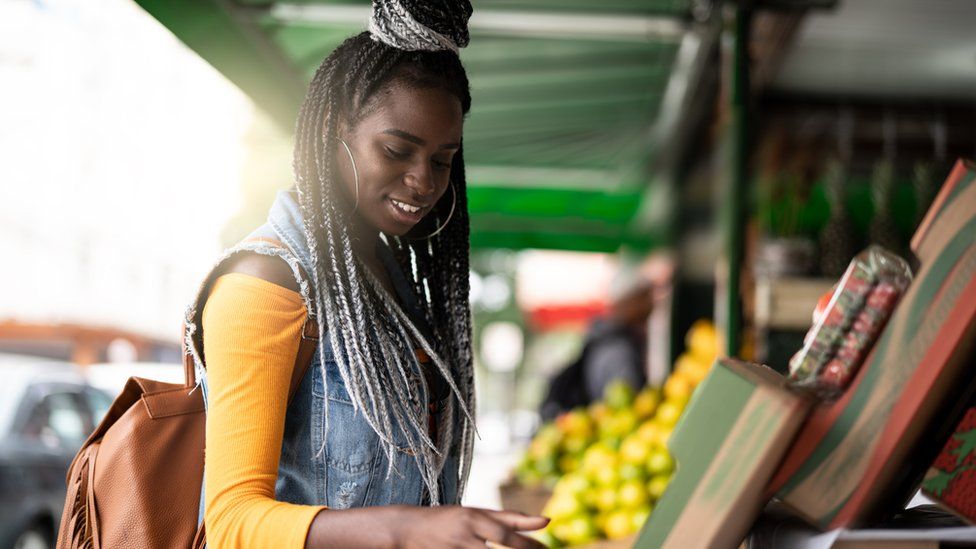Nigeria's economy: Why people are buying sanitary pads in packs of two
SharecloseShare pageCopy linkAbout sharingImage source, Getty ImagesNo woman in the world can have their period using just two disposable sanitary pads. A typical pack of eight is hardly enough, yet in Nigeria a sachet, or small plastic pouch, containing two pads are now being widely sold as an affordable option.In richer countries, the sachet may be considered a convenient, portable alternative, but in Nigeria it is seen as something more concerning.The appearance of the sanitary pads in these small packs was “mind-boggling”, according to women’s health activist Dr Chioma Nwakanma. They do not represent convenience but rather a more difficult choice as some women are no longer able to afford to cover their whole period.”Even when it was an eight-pack it was sometimes not enough, so now people buy the sachet and start picking what day to use it,” Dr Nwakanma told the BBC.”The options of what else to use – tissues and rags – are unsanitary and terribly unhygienic so it’s unimaginable what’s going on.” The proliferation of these sachets of essential goods and processed food items in Nigeria tells a story about what has happened to the cost of living.With annual inflation peaking at 18% in March last year, and food inflation reaching 23%, this rise in the cost of living has created what is being termed by some as a “sachet economy”.In addition to sanitary pads, everything from baby food to cooking oil to breakfast cereal can now be bought in smaller portions, which are more affordable as the dramatic price increases have outstripped wage rises.”I used to buy things in cartons so they last longer. Now I’ve started to buy whatever sachet is cheapest,” said Chika Adetoye, who is worried about being able to afford enough food for her three children.The sachet phenomenon began to be noticed towards the end of 2020 as photos were shared on social media of items that consumers believed had not been seen in small packs before, including Baileys cream liqueur.Everything eventually enters sachet here. Just hang me inside Danfo, make e complete. pic.twitter.com/l8J2bCsKLN— Tolúlọpé (@tolusaba) November 15, 2020
The BBC is not responsible for the content of external sites.View original tweet on TwitterBut as well as processed and manufactured goods, the price rises have also hit fresh produce.In the markets, stallholders say they are simply passing on the costs. They cannot remember the last time they had to pay this much to stock up.The hectic and noisy Oyingbo market in Lagos is a popular place to hunt for a bargain, but those are difficult to find now.A sack of the popular greens known as bitter leaf has doubled over the past year, stallholder Nancy Ike told the BBC.”Things are too expensive, people cannot afford it,” she said.In another sign of increasing hardship, it is now possible to buy individual slices of yam whereas once customers would only be offered the whole tuber.While doing her Christmas food shopping last month, Chioma Chukwu really noticed the difference.”Last year I came to the market with 20,000 naira ($48; £35). This year, I have 30,000″ but couldn’t buy as much, she said.Gloria Joseph-Raji, senior economist at the World Bank in Nigeria, links the high prices to recent government policies.In 2015, the country’s central bank issued a list of 41 items, including rice, margarine and tomatoes – as well as private jets and toothpicks – that would no longer be eligible for foreign exchange from official sources.The idea was to limit imports and encourage local production. Since then the authorities have expanded and modified the list, adding sugar and wheat last April.In a move to cut the smuggling that resulted, the country’s land borders were closed in 2019.”This recent high episode of inflation that we see actually started in 2019 and this was post-border closure,” Ms Joseph-Raji said.”That reduced the flow of food and other types of products that usually had come in through the borders to supplement domestic production.”‘Trade needs a boost’The borders were re-opened in December 2020 but there are still shortages.When demand exceeds supply, basic economic theory suggests that prices will rise.”Land borders are open but trade flows across the borders are still slow,” Ms Joseph-Raji said. “So whatever can be done to improve the trade flows… will contribute to driving down prices.”In the meantime the high prices are having a big impact on people’s lives. The World Bank estimates that by its measure the recent inflation pushed another seven million Nigerians into poverty. The total figure is now more than 100 million – roughly half the population.The increase in inflation may be past its peak, but it is unclear when it will fall to more manageable levels.In the meantime, the sachets will be here to stay as people try to stretch their family budgets to cover essentials from sanitary pads to vegetables.

